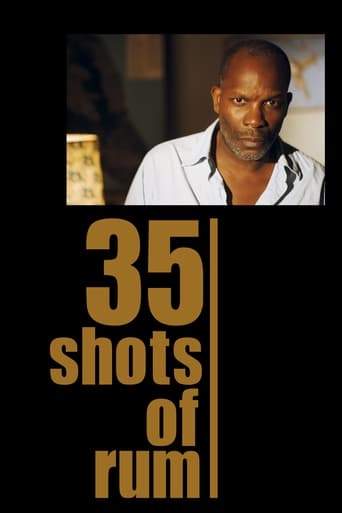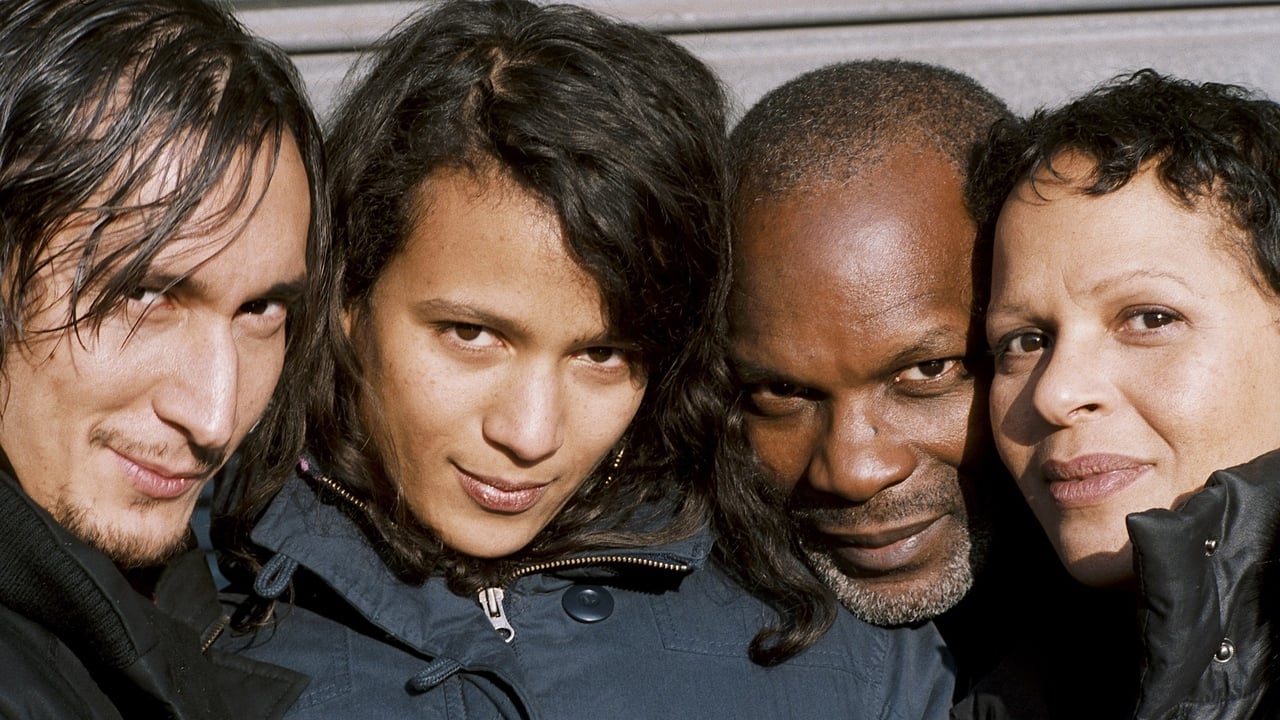FilmCriticLalitRao
Loneliness is a strange feeling as one can be lonely even while being surrounded by huge armies of people. 35 shots of Rum appears to celebrate loneliness as it allows its protagonists to explore their inner world where loneliness is an expression of their choice which they use in order to reveal their strengths and weaknesses. This film is a sensible study which highlights the strengths and weaknesses of human character. This study is carried out through the depiction of human life's most ordinary moments namely a woman buying a rice cooker, a car getting stuck during a rainy season etc. 35 shots of rum is balanced in his approach as loneliness has also been depicted as a life threatening sentiment which claims numerous victims. One such victim dies after having been viciously attacked by fate. French director Claire Denis chose to depict a quiet yet fragile daughter/father relationship which is not able to stand the test of time. This is shown in the form of cracks which begin to slowly destroy an innocent daughter/father relationship when both of them choose to part in order to be with their loved ones.
Framescourer
It is a commendation of this film that I simply didn't know what the broad story was after an hour - and still didn't by the end to which I had felt, nonetheless, compelled to watch. Claire Denis' film is called 35 Shots of Rum in reference to a ritual drink binge. The actual occasion for the 35 shots is never made explicit, and so it is with the causal scaffold of the story. As in Pinter, we are invited to experience the relationship-in-itself between characters, devoid of a context which might qualify it. My feeling was that, unlike Pinter, this was actually to get us to extrapolate our own idea of what their relationships consist in.There are hints which one can use as a prop but essentially we are left with a strange - and fantastically controlled (rather like Michael Haneke's contemporaneous The White Ribbon) coil of narrative that juxtaposes happiness with tumescent tension. The lack of narrative can be frustrating but it is actually a more eloquent representative of the naturally complex and sometimes contradictory humanity that constitutes these characters (who are all conspicuously handsome, by the way!). Fine film-making at the very limit of convention. 6/10
you'llneverbe
"35 Rhums" (2008) Dir.: Claire Denis'35 Rhums' is a slow, elliptical and deliberate film revolving around the four tenants of a house in what appears to be the greater Paris area. At its core are a father (Lionel) and his late-teenage daughter (Josephine), with the middle-aged taxi driver Gabrielle and the impulsive young Noe, living downstairs with his cat, rounding off a kind of extended family. They seem closer than your usual co-tenants and there's a suggested intimacy behind their functional and un-dramatic interactions, though this is all left unexplained for quite some time; indeed, so much so that it's tempting for the viewer to wonder if they've missed some crucial dialogue or failed to infer something that Claire Denis has intended them to. But this is a film that rewards not only patience but also a keen eye for behavioural detail. The realism of '35 Rhums' lies in its understatement of the relationships, shared histories, and occurrences (large and small) that make up the story. This is, I think, one of the finer points of the film, though it only became apparent upon further reflection.Lionel is a train driver and his daughter is a student. The absence of a mother in the apartment is immediately clear but, like many other aspects of the film, the specifics are not elaborated on as part of the setup. Neither is the wistfulness of Gabrielle as she chain-smokes and awaits Lionel's return home from nights at work, where his co-worker Rene is depressed about his upcoming retirement. (We see that the colleagues are as close-knit as the tenants.) Noe is restless and muses on his tendency not to settle anywhere too long. In an amusing scene, he discovers his aged cat has died in her sleep and offhandedly decides to take a job in Angola because there's nothing to stick around for any longer. This upsets Josephine, and she takes off to Germany with her father for a few days.All this occurs within a fairly short time frame, and in between we are shown glimpses of the unexplained histories that made the first half of the film a little vague. In fact, there is a particular scene where I felt that the movie really connected itself: Gabrielle's cab breaks down on the way to a concert, and the four co-tenants are sheltered from a rainstorm in an empty bar. Resigned to the evening's ruined plans, they eat and drink away, and over this long set piece all the hints and glances and suggestions of the preceding scenes are brought together and made into something tenable. From here, '35 Rhums' leads us successfully through moments of comedy, tragedy and finality. Crucially, it never changes its pace or its observational filming style after this point. To do so would cheapen the tone of the introductory hour, and be rather jarring at that. It reaches its end without any great resolution, which could be seen as a weakness by anyone still expecting a traditional climax by this stage. But if you're already this far into the film (and this review), that probably doesn't apply to you. We are left to assume that the characters' lives simply go on, though not unchanged by certain events and discoveries that I won't spoil for anyone here.The impression I came away with is that '35 Rhums' is an intimate film about the culmination of people, events of the past and present, and how these can close off little chapters of our lives and sometimes go unnoticed. It is not for everyone, and it is definitely not flawless - there's some dangling symbolism to do with rice cookers (yup, you read right), and I can't work out if Claire Denis is trying to make a social point with the virtually all-black casting. Aside from a short scene at the university where students are discussing the Third World debt, it seems to be entirely incidental (which, in turn, makes the dialogue in that scene appear incidental also). But my knowledge of urban French societal make-up is nil, so I can't comment further. It is essentially a decent and touching work, very well acted and captured, and if you have patience and aren't averse to a definite French style, then it could be your kind of movie.
incitatus-org
The quiet Lionel (played by the cool Alex Descas) lives with his grown up daughter Joséphine (newcomer Mati Diop) in a comfortable, albeit somewhat sterile, grey, contemporary apartment in a Parisian suburb. Life has unfortunately taken away Lionel's wife, and left the two-person family in a state of tranquil solitude, where the father and daughter lean on each other in the big wide world. This outside world is there, as their entourage, but they keep it at bay. Lionel knows they can not continue living like that indefinitely, and one day he will have to let his daughter go, to live her own life, but silently he hopes that that day will be far off. When their upstairs neighbour Noé, who has always been there, announces that he will leave, Joséphine gets angry. It is at that moment that she too realises that the world around her can not be forever frozen. It is time to look ahead.The small family is running on a borrowed time, but happy to be together while they still can. They are compared to Gabrielle, the family friend, who lives in hope and the afore mentioned neighbour Noé, who lives, disorientated, in painful past of his parents' death. Both of them cling to Lionel and Joséphine for their stability, for the calm love they share. As a viewer, you can not help but feel that Lionel "should" be living with Gabrielle and Joséphine with Noé, as that would be a more natural state than a grown-up girl living with her father. But of course, there are no rules to who who should be living with who. Or are there? When Lionel and Joséphine look to their future, what do they see? This in between state, at the end of the close-knit family life and the starting of your own, is the playing field of the film. 35 Rhums, is a very slow movie with a close attention to detail, reminiscent of Claire Denis' Vendredi Soir. We see what is going on, through the actions of the characters, leaving very little to be said. The consequence of such an approach is that you have to slow down the pace, to allow the audience time to take in those details. There lies the risk, and although I was taken in by characters, the "normal" gestures or running of the train through the urban landscape scenes are a little too customary to warrant such an exposure. Whether or not this will bother you is hard to judge, but you will need to be a bit indulgent.Racially, the movie is quite a curiosity. Lionel is black and his wife was white so their daughter, evidently, is métis. So far all is normal. Joséphine's love interest and upstairs neighbour Noé is white. The family friend Gabrielle looks Caribbean. Still fine. Then we get to see his colleagues at the railways, the SNCF, and they are all black! Is there an SNCF line which hires only staff of African or Caribbean descent? Not very likely. And then there is Joséphine's university: the professor and all the students are black! Not even at the university of Martinique, where most people are black, is it an easy feat to write yourself in for a course where not a single white or other raced student has written himself in. What is the point of this bizarre image? Even if they were part of some community (e.g. Caribbean), then that would make more sense showing it in opposition to another French community (say mainstream or Chinese) rather then an artificial submersion. But they are not part of a subculture (no more than their own individuality) nor are the SNCF colleagues or the students. It is a strange touch which is unrealistic and seemingly without purpose.Overall 35 Rhums is a carefully crafted film well worth its time, despite its weaknesses. Make sure you are not tired when you go it, to be able to take in the rhythm, as you are taken along the tracks in the Parisian behind-the-scenes. Lionel and Joséphine will linger with you long after the lights are back on.


 AD
AD

